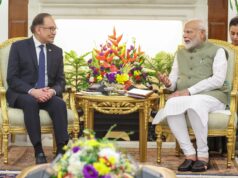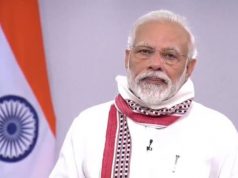

The two countries also decided to enhance cooperation in defence and other strategic areas and also signed five pacts covering defence exchanges, cooperation in clean energy, roads and highways, healthcare and women while vowing to take their relationship to newer level.
Japan also lifted ban on six Indian entities including Hindustan Aeronautics Limited (HAL) which had been imposed in the aftermath of 1998 nuclear tests.
During the five-day visit, his first outside the subcontinent since becoming PM in May, Modi invited Japanese investments while hard-selling India as a conducive destination for business particularly for the manufacturing sector.
He told the Japanese businessmen that India was awaiting the investments with a ‘red carpet’ and not ‘red tape’ as rules and procedures have been eased by his government.
Winding up his official programme on Tuesday, Modi had expressed gratitude to Japan for reposing “trust” in India and demonstrating its friendship with a quip “yeh fevicol se be zyada mazboot jod hai (this bond is stronger than that of fevicol)”.
“This visit has been very successful,” Modi had said at the Indian community reception hosted in his honour here earlier. “There has been talk about billions and millions.
But there has never been talk of trillions,” he said, referring to 3.5 trillion Yen (USD 35 billion or 2,10,000 crore) promised by Japan to India through public and private funding over the five years for various works, including building of smart cities and cleanup of the Ganga river.
During the talks between Modi and Japanese PM Shinzo Abe, the two sides agreed to enhance their defence and strategic cooperation to a new level and also decided to speed up negotiations on civil nuclear deal that could not be concluded now.
Striking good personal chemistry, the two leaders had “very fruitful” exchanges. Abe also went out of his way to receive Modi in Kyoto when he went there on August 30 in the first leg of his 5-day tour.
In Kyoto, a pact was signed under which Modi’s Lok Sabha constituency Varanasi would be developed on the pattern of Kyoto ‘smart city’ with the help of Japan.
Abe also announced that as an example of Indo-Japan Cooperation, Tokyo will help India in providing financial, technical and operational support to introduce Bullet trains, a project that Modi has been actively pursuing.
“This is not just raising the relationship from one category to another… Our relationship is not only regional in its framework, but will have a global impact,” Modi, who concluded his five-day visit to Japan, said.
-INDIA TODAY










